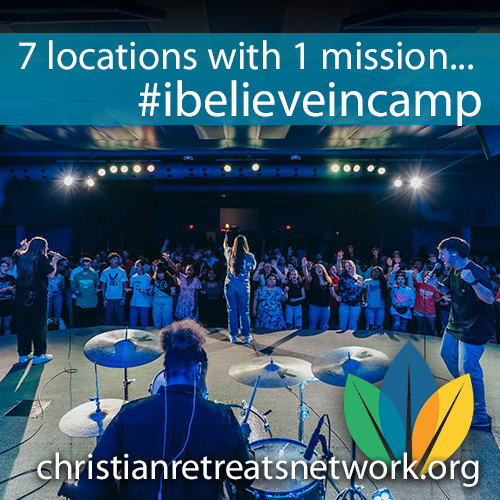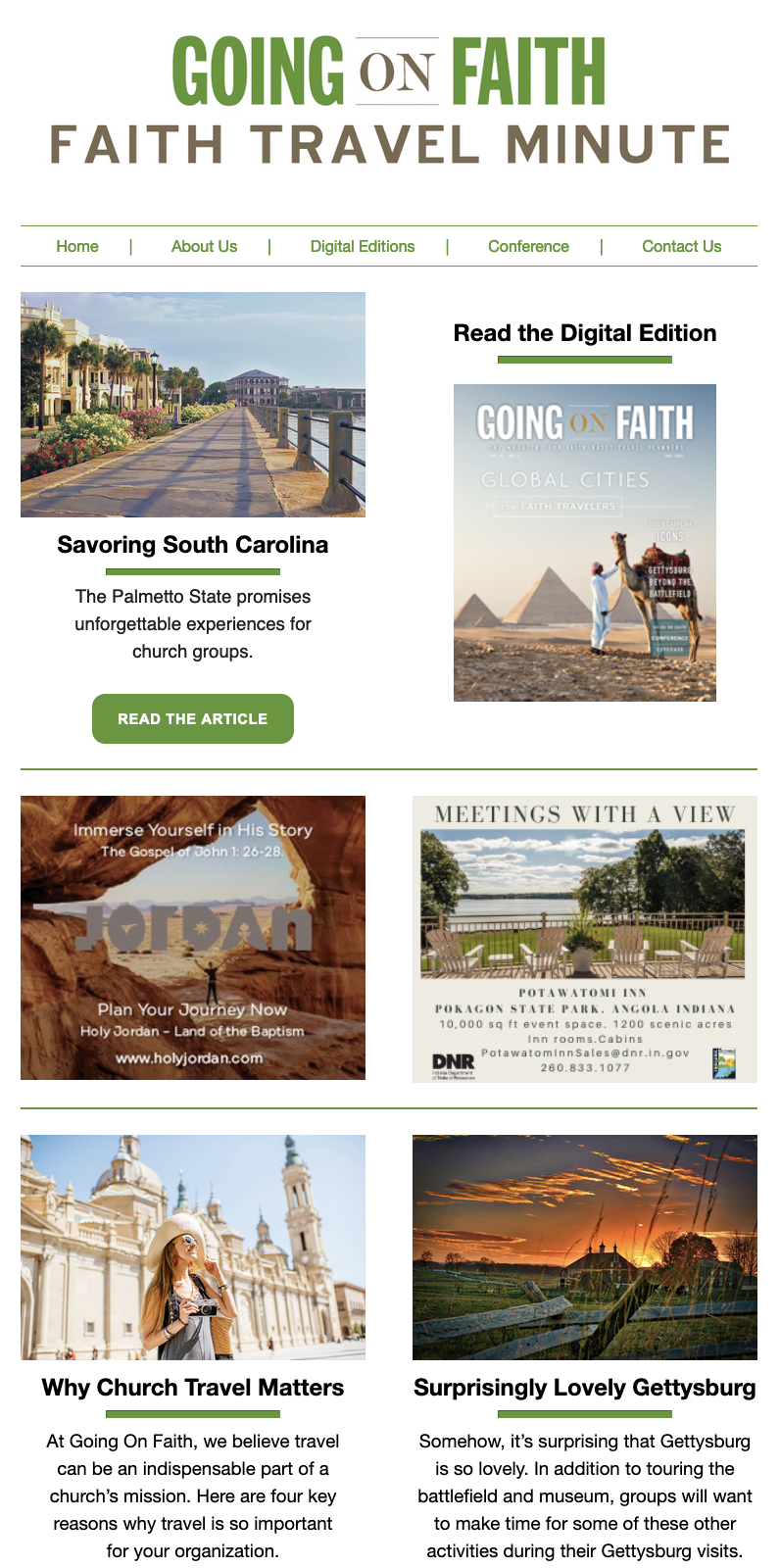
Today’s church group travel leader has a problem: With banks, university alumni associations, senior centers and myriad other organizations offering tours to their members, churches have a lot of competition on their hands.
Adult travelers have no shortage of options when choosing a vacation, and those who are interested in going on traditional tours can take them with any number of groups. In many cases, these groups offer the same kinds of trips that you do, with the same destinations, attractions, hotels and even tour operators. Sometimes, they can even offer them at better prices.
So how does a church group compete? How do you offer compelling trips that your congregation members will be willing to spend money to join? How do you convince them to travel with you instead of with someone else?
The answer is simple: purpose.
As people of faith traveling together, we are in a unique position. Unlike other travel providers, there is an eternal purpose in what we do. We don’t travel together just to have fun, just to see the world, or just to make money. Church travel is about building community, deepening our faith and spreading the message that has affected our lives so deeply.
Everything we use for travel — our time, resources and talents — are gifts from God. We don’t own them, but we do have a responsibility to use them in a way that will advance his purposes here on earth. What we do as church travelers can have an impact on us, our travelers, our congregations and the places we visit.
Building a travel ministry
One of the great advancements in the faith-based travel industry in the past decade is the understanding that church travel can be more than just a seniors group or a club; churches around the country are beginning to look at what they do as a travel ministry. Traveling opens people’s hearts and minds to new experiences and new ideas. It exposes us to the undeniable beauty of God’s creation, whether we visit Yellowstone, New England or the deserts of Israel.
Group travel builds relationships and forges stronger bonds inside a church community. When we travel with people, we share life with them for a time, enjoying common experiences, common hardships and common joys. Group travel builds the church and builds relationships. Church group travel is a ministry.
Once you understand that your group travel is part of your church’s ministry, you can begin to develop a sense of purpose for your travel program. A great place to start is with the vision and purpose of your church: Do you emphasize evangelistic outreach? Community service? Youth or student ministry? Foreign missions? Whatever you find at the heartbeat of your church will also help you grow a sense of purpose for your travel ministry.
To make it a stronger ministry, get the church involved and spread the word about what you’re doing. Develop a mission statement that outlines how your travel program will help build the greater vision of the church and then recruit your pastor and church leadership to help spread the word about what you’re trying to do.
Eternity in view
Once you have a firm grasp on the vision of your church and the purpose you’d like to pursue for your travel group, you can begin to plan your trips with your purpose in mind. This makes for something much greater than the average group tour that is being sold all around town. It’s travel with eternity in view.
What does that entail? There are plenty of ways to go, but here are five key areas where your travel program can grow to fulfill a spiritual purpose.
1) Create opportunities for fellowship and spiritual growth.
Incorporate aspects of a church retreat into your itinerary — pray together, study the Bible together, have a devotional time on the bus. Share with each other, exchanging testimonies, life stories, prayer requests and other concerns. If there’s a musician in your group, ask that he or she bring a guitar and worship together, or sing your favorite old hymns a cappella as the bus rolls down the road.
If you want to get more involved in this area, you can plan breakout times into your itinerary, giving people an opportunity to pray and share together in small groups. And if some of these ideas sound a bit uncomfortable to you, they’re probably going to seem foreign to your travelers, too. So don’t be afraid to take the lead, even if you feel out of your element. Other travelers will join you, and soon, they will embrace these opportunities to grow spiritually together.
2) Create connections with the world around you and the places you visit.
Don’t just visit — interact. Find ways to make one-on-one contacts with the culture you’re visiting through home stays, church visits or shared meals with members of the local community. Make an effort to connect with the local church and its work wherever you can go. You can take part in a local community service project or share in another church’s celebrations.
The experience will be even more powerful if you take opportunities to break down walls and cross boundaries. Visiting with churches of different ethnicities, denominations or worship styles can be rich and rewarding for your travelers.
3) Give back and serve the communities you visit.
Voluntourism has become a hot term in our industry today, and there’s a powerful reason: It is more blessed to give than to receive. So take advantage of the many voluntourism opportunities offered by tour operators, tourist boards, and convention and visitors bureaus. You can also take the initiative to find places to serve in the destinations that you’re planning to visit. And ask your travel providers to help with this. If they want your business, they should be willing to work with you to help build purpose into your tours.
As you progress in this area, you might find growing interest in service trips. You can plan short day trips or overnight trips to do service projects in destinations closer to home. And don’t be surprised if volunteer opportunities become the highlight of your trips. Giving back affirms our sense of purpose. It’s the church being who we’re supposed to be.
4) Make your trips attractive to a variety of age groups.
Get creative with flexible itineraries. Include a lot of free time, and pick some attractions and activities like theme parks, adventure sports, beaches and concerts that appeal to boomers, youth or families. Use hotel properties that cater to families, and adjust the price point of your tour to make it attractive to the demographic you are trying to reach.
It may sound far-fetched to include younger people on a traditional group tour, but it’s not as unlikely as you may think. Be the one to step out and bridge the generation gap, volunteering to chaperone a youth trip or activity. You’ll be surprised at how easily you can begin to build between generations.
5) Inreach and outreach.
Use travel as a way to reach people inside and outside the church that could use encouragement. Make a point to personally invite people from church to go with you (sometimes a shy person will feel more welcome if you’ve extended a hand to them). Find ways to help those who can’t afford the trip by asking travelers to contribute a little bit extra, arranging room sharing or passing along an escort comp.
Encourage people to invite friends and family from outside the church to come on your trips and then use the time together to show the love of Christ to church members and visitors alike. As the days of the trip go by and people grow closer, they begin to open their lives to one another, creating opportunities for meaningful ministry.
These are just some ideas to get you started; I’m sure there are many more. Not everything on this list will work for your group, but try some that sound good and see where they take you. One thing is certain: Your trips will become much more than just another group tour.










